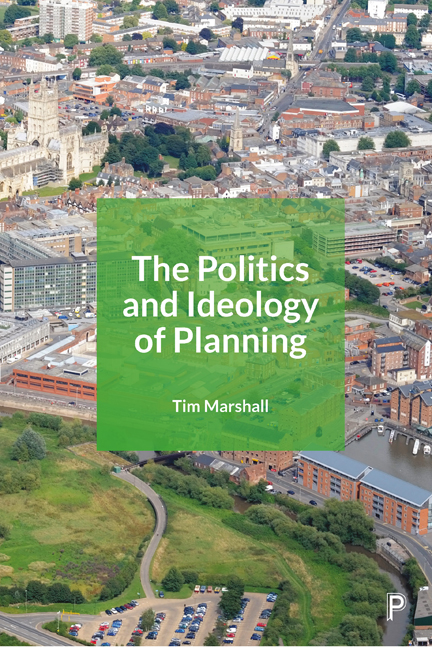Book contents
- Frontmatter
- Contents
- List of figures and tables
- List of abbreviations
- Acknowledgements
- 1 Introducing planning, politics and ideology
- 2 Writing on politics and ideology in planning
- 3 Ideologies in Britain, with initial linking to planning
- 4 Planning history, planning reform and politics and ideology
- 5 Planning expertise and planning law: autonomy from politics and ideology?
- 6 Ideology and politics in government, central and local
- 7 Ideology and politics in professions, lobbying, consultancies and pressure groups
- 8 Communication, the media and deliberation
- 9 Facets of planning action: heritage, local environment and design
- 10 Fields of planning action: housing, economy and infrastructure
- 11 Paths to improving the ideological and political dimensions of planning
- References
- Index
7 - Ideology and politics in professions, lobbying, consultancies and pressure groups
Published online by Cambridge University Press: 05 January 2022
- Frontmatter
- Contents
- List of figures and tables
- List of abbreviations
- Acknowledgements
- 1 Introducing planning, politics and ideology
- 2 Writing on politics and ideology in planning
- 3 Ideologies in Britain, with initial linking to planning
- 4 Planning history, planning reform and politics and ideology
- 5 Planning expertise and planning law: autonomy from politics and ideology?
- 6 Ideology and politics in government, central and local
- 7 Ideology and politics in professions, lobbying, consultancies and pressure groups
- 8 Communication, the media and deliberation
- 9 Facets of planning action: heritage, local environment and design
- 10 Fields of planning action: housing, economy and infrastructure
- 11 Paths to improving the ideological and political dimensions of planning
- References
- Index
Summary
We have examined the central importance of government institutions for planning, and presented their heavily ideological as well as evidently political structuring. That is government seen from the inside. This chapter looks at the pressures brought to bear on government from outside, from the forces active in societies seeking to influence the actions of governments – of all kinds, but here of course keeping the main focus on planning actions. Again, this is a core area of the subject of political science, as well as a matter of great practical interest to political activists. Both academic observers and involved actors have written on how pressure-group politics work in Britain, and we can draw on strands of both writing. The media are in many respects part of the complex studied here, but their importance makes it easier to deal with them in a dedicated chapter. But the intertwining of pressure and mediation should be borne in mind.
The position of pressure groups in politics
As in the field of politics as a whole (touched on in Chapter 1), we can start with two camps of opinion on how pressure politics works. The broadly pluralist view is that pressure groups are essential to give some balance to a democratic polity, allowing a more informed and balanced debate to develop on any issue. This is seen as complementing electoral politics of all kinds and the roles of political parties, both of which are often seen as severely limited on their own. It is assumed that views will emerge which cover a wide range of positions and that this will give at least a platform for discussion.
A less optimistic view of the likely situation of pressure politics is that certain interests will always come to be stronger in expressing viewpoints and developing the knowledge base on any topic – the elitist or sometimes Marxist position. This will tend to mean that, far from balancing the political system as it functions through elections and political parties, pressure politics will reinforce the already present tendency for the best-resourced societal forces to dominate the politics of a country – normally through wealthy interests controlling media and other means of policy development.
- Type
- Chapter
- Information
- The Politics and Ideology of Planning , pp. 131 - 158Publisher: Bristol University PressPrint publication year: 2020



